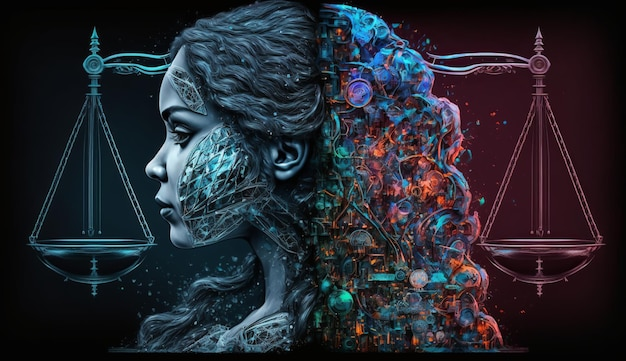The Future of AI and Social Justice is a critical discussion as we navigate the rapidly evolving landscape of technology and its impact on our society. Ruha Benjamin, a noted sociologist, emphasizes that rather than accepting a dystopian outlook, we should envision a future that promotes human values and equitable technology. In her Tanner Lectures, she highlights how many AI applications, while branded as progressive, can inadvertently perpetuate social injustice and oppression, particularly against marginalized communities. Ethical considerations in technology are paramount as we assess the implications of AI-driven decisions that often lack emotional intelligence and societal awareness. By challenging the narratives pushed by tech elites and engaging in meaningful discourse about AI and social justice, we can cultivate innovative alternatives that prioritize the collective good over profit.
As we explore the intersection of artificial intelligence and equitable social practices, it is vital to consider the diverse implications that technology holds for humanity. The dialogues led by academic figures like Ruha Benjamin inspire us to rethink our current trajectory concerning ethics in technology. Rather than succumbing to a narrative dominated by those in power, we must advocate for alternative visions that prioritize justice and human dignity. In this context, AI should not only be seen as a tool for efficiency but also as a potential catalyst for societal transformation. Emphasizing a holistic outlook allows us to challenge the status quo and imagine a future characterized by fairness and inclusivity.
Rethinking AI: Bridging the Gap Between Technology and Human Values
At the heart of Ruha Benjamin’s argument is the necessity to intertwine human values with the development of artificial intelligence. As she posits, the common narrative praises AI as a vehicle for efficiency and progress, yet this often overlooks the ethical implications entwined within technology. Benjamin points to historic injustices, paralleling AI’s potential to marginalize and oppress likened to the eugenics movement. The challenge lies not only in employing advanced algorithms but in ensuring they are informed by a profound understanding of societal context and historical impacts.
To navigate this complex landscape, it’s crucial that AI developers engage with diverse perspectives, especially those emerging from marginalized communities. Incorporating voices from the arts and humanities can facilitate a shift towards more ethical and inclusive technological practices. By prioritizing human experiences and cultural contexts in technology development, we can mitigate the risks of creating systems that, while efficient, might inadvertently perpetuate social injustices.
Frequently Asked Questions
What is the relationship between AI and social justice in the future?
The future of AI and social justice is an evolving discourse that explores how AI technologies can both support and undermine equity. Scholars like Ruha Benjamin highlight that while AI may promise efficiency, it often exacerbates existing injustices, particularly for marginalized communities. Therefore, envisioning a future where AI serves social justice requires critical thinking and inclusive dialogue.
How does Ruha Benjamin view the impact of AI on marginalized communities?
Ruha Benjamin emphasizes that AI technologies often perpetuate discrimination, citing incidents like the misuse of facial recognition software leading to false arrests. She argues that a future of AI should prioritize human experiences and social contexts, rather than relying solely on algorithms that may dismiss vulnerable groups.
What alternatives to a dystopian future with AI does Ruha Benjamin propose?
Rather than accepting a dystopian future shaped by AI, Ruha Benjamin advocates for imaginative approaches that promote human values and creativity. She suggests that society reassess priorities, moving away from technological elitism towards cooperative solutions like accessible public goods and community-focused innovations.
How can ethics in technology influence the future of AI and social justice?
Ethics in technology play a crucial role in shaping the future of AI and social justice by ensuring that AI development considers moral implications for society. Engaging diverse voices, particularly from humanities and social sciences, is essential for creating AI solutions that prioritize equity and human dignity, rather than mere efficiency.
What role do creativity and imagination play in shaping a just future with AI?
Creativity and imagination are fundamental to envisioning a future with AI that transcends current limitations. Ruha Benjamin calls for a reimagining of AI technologies to prioritize justice, urging us to think beyond traditional frameworks and explore transformative ideas that promote inclusive social systems.
| Key Points | Details |
|---|---|
| Radical Future Imagination | Ruha Benjamin encourages citizens to envision a drastically different future, contrasting with tech CEOs’ self-serving visions. |
| Criticism of Tech Elites | Tech billionaires’ notions of altruism are often self-interested; they are not reliable stewards for societal good. |
| AI and Oppression | Technologies sold as ‘efficient’ may perpetuate injustices, exemplified by bias in facial recognition and healthcare algorithms. |
| Moral Decision-Making | AI’s perceived neutrality in decision-making can harm marginalized communities, likening it to historical eugenics. |
| Need for Diverse Knowledge | Benjamin calls for inclusion of varied knowledge, advocating that tech creators should understand societal implications. |
| Encouragement for Creativity | She urges a shift towards creativity and inquiry in arts and humanities to envision a just future. |
| Beyond Current Systems | Benjamin advocates for reimagining systems rather than merely trying to improve harmful existing ones. |
Summary
The Future of AI and Social Justice hinges on our ability to envision a more equitable world. Ruha Benjamin challenges the narrative presented by tech elites, urging everyone to think creatively about how AI can serve society without perpetuating inequality. She emphasizes the need for diverse perspectives in technological development and advocates for an imaginative approach that goes beyond mere efficiency. By championing the arts and humanities, we can cultivate the critical thinking necessary to reshape our future, ensuring that it is just, inclusive, and free from the oppression that technology often exacerbates.
